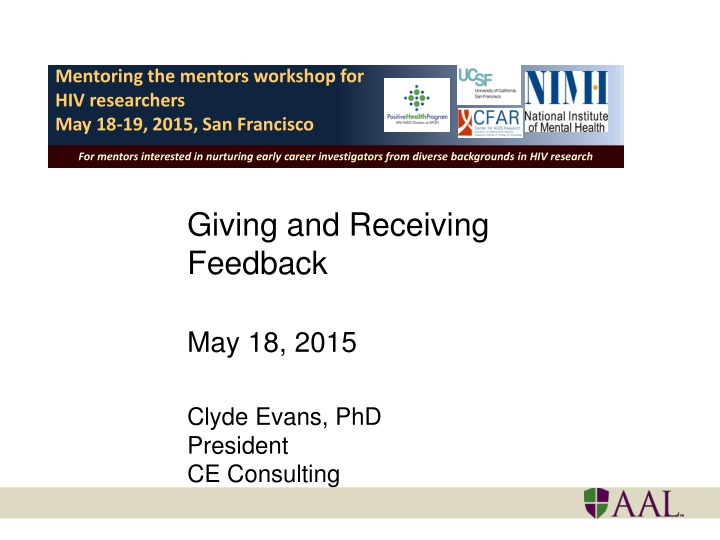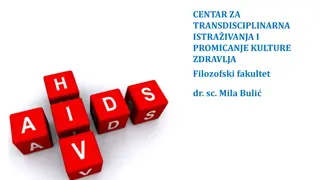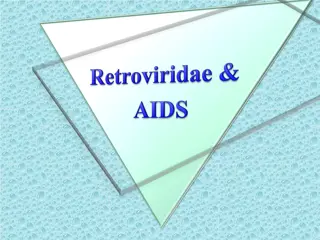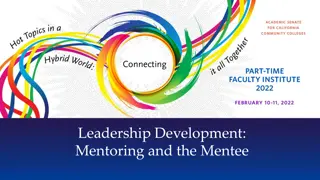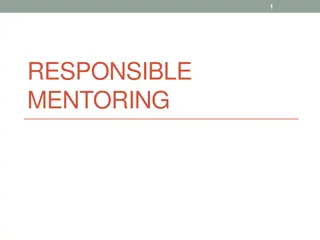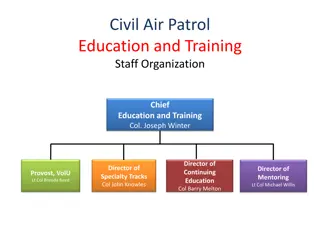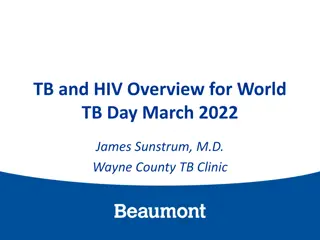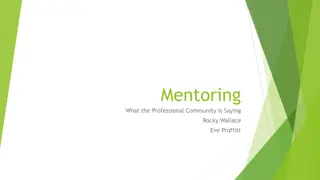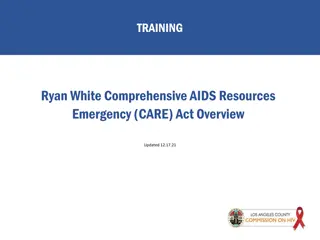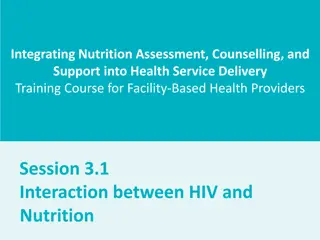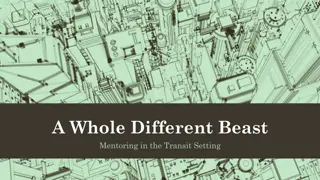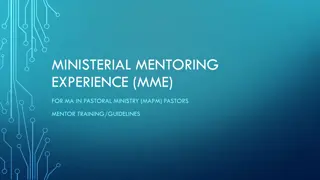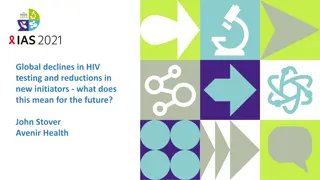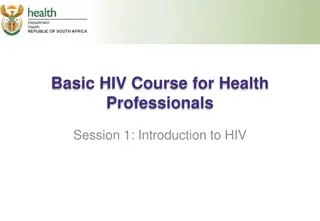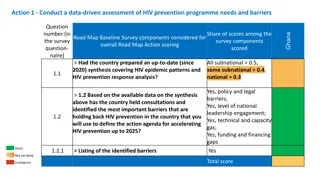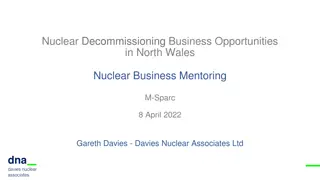Feedback and Mentoring Workshop for HIV Researchers
Mentoring workshop for HIV researchers focusing on giving and receiving feedback, nurturing early career investigators, and working with faculty continuum. The workshop offers insights on feedback exercises, assumptions, and rhetorical questions about feedback. Participants are encouraged to reflect on their feedback practices and the importance of constructive feedback in professional development.
Download Presentation

Please find below an Image/Link to download the presentation.
The content on the website is provided AS IS for your information and personal use only. It may not be sold, licensed, or shared on other websites without obtaining consent from the author.If you encounter any issues during the download, it is possible that the publisher has removed the file from their server.
You are allowed to download the files provided on this website for personal or commercial use, subject to the condition that they are used lawfully. All files are the property of their respective owners.
The content on the website is provided AS IS for your information and personal use only. It may not be sold, licensed, or shared on other websites without obtaining consent from the author.
E N D
Presentation Transcript
Mentoring the mentors workshop for HIV researchers May 18-19, 2015, San Francisco http://t2.gstatic.com/images?q=tbn:ANd9GcS2vU2FsxFQZtBoa7H1o1R-jKZV7h2NM54DWfyOJIdNWDN5yKE-pg For mentors interested in nurturing early career investigators from diverse backgrounds in HIV research Giving and Receiving Feedback May 18, 2015 Clyde Evans, PhD President CE Consulting
Working with Faculty Continuum Giving and Receiving Feedback Performance Appraisal Developing Faculty Mentoring and Coaching
Working with Faculty Continuum Feedback--sharing of information Performance appraisal--assessing task achievement Mentoring/coaching-personally facilitating individual success or advancement
My Assumptions You know more than you realize. Let s build on that and enhance it so you can be more intentional/planful/strategic.
Two questions 1. How many of you receive good, consistent feedback from the people with whom you currently work? 2. How many of you give good, consistent feedback to the people with whom you currently work? In each case, why do you think that is?
Feedback Exercise Hold your hands just above your desk and try to recall the number of times that you have received valuable feedback during the last 7 days. For each occasion that you RECEIVED valuable feedback, place one finger of your left hand on the desk. For each occasion that you have GIVEN valuable feedback, place one finger of your right hand on your desk. Now look at your fingers. Did you run out of fingers or are they still hovering in the air? Now look at your colleagues fingers.
FEEDBACK What s the first thing that comes to mind?
How do you really feel about feedback?
Some Rhetorical Questions About Feedback Is feedback always negative? (Answer with your gut, not your brain.) Is feedback the same as criticism? Does feedback always imply a superior- subordinate relationship? Will someone accept negative feedback from you, if you ve never given them positive feedback?
Feedback Exercise Recall a memorable feedback experience You get to say what memorable means.
Feedback Exercise Debrief: Part 1 Was it giving or receiving? What made it memorable? What, if anything, could have made it better? What did you personally take away about feedback from that experience? Discuss in pairs
Feedback Exercise Debrief: Part 2 In small groups, convert your lessons learned into tips and guidelines for giving feedback DOs DON Ts 1. 1. 2. 2. 3. 3.
Reflection 1 How do you personally stack-up vis- -vis these DOs and DON Ts? Do you see specific areas where you would like to improve? How do you handle the hard cases ? How do your decide when to give feedback and when to keep quiet?
Mini Case Study Two colleagues, Dr. Maxim and Dr. Lao, have just presented their research results at a conference. A question from the audience challenges the pair s conclusions. Dr. Maxim responds defensively because he heard and experienced the challenge as an attack. Dr. Lao jumps into the discussion with a very different attitude; she welcomes the challenge and is eager to debate the data that led to the conclusion. NIH Field Guide Collaboration and Team Science
Mini Case Study What feedback would you give if Dr. Lao were your mentee? What would you say? What feedback would you give if Dr. Maxim were your mentee? What would you say?
Reflection 2 What would be the most meaningful or valuable feedback you could receive from one of your colleagues?
Reflection 2 What would be the most meaningful or valuable feedback you could receive from one of your colleagues? What would be the most meaningful or valuable feedback you could give your mentee?
Reflection 2 What would be the most meaningful or valuable feedback you could receive from one of your colleagues? What would be the most meaningful or valuable feedback you could give your mentee? What would be the most meaningful or valuable feedback you could receive from your mentor [answered by your mentee]?
What does literature/research say about Good Feedback Bad Feedback
Seven Characteristics of Effective Feedback (One Person s List) 1. Descriptive and non-evaluative 2. Specific 3. Behaviorally anchored 4. Well-timed 5. Limited in quantity 6. Positive as well as corrective 7. Anticipatory guidance Ende J. Feedback in clinical medical education. JAMA: 1983: 250:777-781.
General Principles about Feedback Consistent, objective and timely feedback on performance is the educational intervention Most likely to produce meaningful change in the behavior of professional trainees. UTHSC-H SMDEP Participants 2007 -Davis DA, 1992 Feedback is second only to competency of faculty. -Wolverton S, Bosworth M. 1985. Fam Medicine clerkship at Duke Feedback lowest rated by students over 10-year period - Kaprielian VS, Gradison M. 1998.
General Principles contd Manner in which feedback is given strongly affected perceptions of helpfulness Feedback given supportively Being gentle and not hitting someone over the head with their mistakes Hewson MG & Little ML. 1998
Unhelpful Feedback Techniques based on different goals than the other person s from someone who projected his/her own issues onto the other person perceived as personal judgments in public setting Hewson & Little
Helpful Feedback Strategies Identify learning objectives Provide orientation during first encounter Make environment safe Assess performance, not person Respond to learner s self assessment Be objective
More helpful strategies Begin with "I" statements Balance negative & positive Anchor feedback to common goals Provide for two-way communication Feedback must be actionable Feedback must be valuable
Helpful Feedback Strategies contd 1. Give as soon after event/incident as possible 2. Start with what went well 3. Try to give one-to-one 4. Focus upon observed behavior 5. Explore alternative behaviors with trainee Donnelly & Kirk
Helpful Feedback Strategies contd Brief Trustworthy and honest Private Normal part of teaching/learning process Provide for follow-up
Getting Feedback An old adage You don t ask, you don t get. If a boss doesn t give feedback, shame on her/him.If you don t ask for it, shame on you. * Evaluate Yourself think about your own view first * Pick Your Spots know when and where to ask each person * Make It Matter don t ask on everything, pick key stuff * Get Specific ask what worked and what to work on * Offer Thanks courtesy and appreciation go a long way in business (Andrew Bergin at http://owningthestagecoach.blogspot.com, reproduced with permission.)
Giving Feedback Follow a time honored HR tip Feedback should be about a person s performance or behavior, not about them as a person .Respect counts. * Be Prepared avoid shoot from the lip feedback * Be Specific vague feedback gives one nothing to work on * Ditch the Dump Truck people can change 1 thing, not 12 * Focus on Facts make it personal and you lose credibility * Watch Your Language substitute and for but * Refuse to Dance don t return emotion with emotion
Receiving Feedback Feedback is the breakfast of champions . Great performers use feedback to raise the level of their game. * Open Your Mind don t get stuck in preconceptions * Listen Well don t interrupt; play it back for clarity * Write It Down Afterwards what s the use if you can t remember? * Gauge Its Relevance to yourself and your role * Do Something With It if you don t apply it, don t ask again
360 Degree Feedback Known to Self Unknown to Self Known to Others Public Self Blind Spots Unknown to Others Hidden Self Unconscious Self Johari s Window
Take Away Lessons What would make YOU better at giving feedback? 1. 2. 3. 4.
